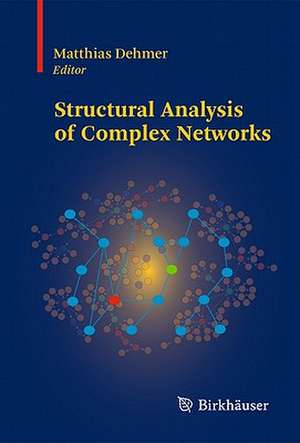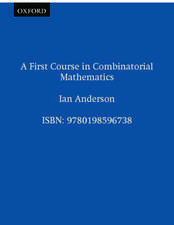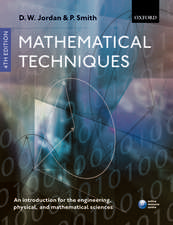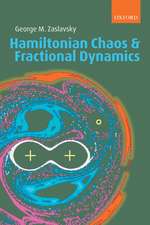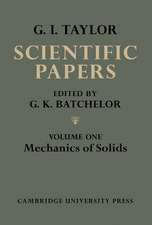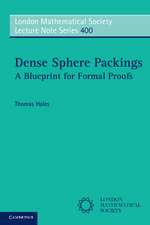Structural Analysis of Complex Networks
Editat de Matthias Dehmeren Limba Engleză Hardback – 27 oct 2010
Filling a gap in literature, this self-contained book presents theoretical and application-oriented results to structurally explore complex networks. The work focuses not only on classical graph-theoretic methods, but also demonstrates the usefulness of structural graph theory as a tool for solving interdisciplinary problems. Special emphasis is given to methods related to: applications in biology, chemistry, linguistics, and data analysis; graph colorings; graph polynomials; information measures for graphs; metrical properties of graphs; partitions and decompositions; and quantitative graph measures.
Structural Analysis of Complex Networks is suitable for a broad, interdisciplinary readership of researchers, practitioners, and graduate students in discrete mathematics, statistics, computer science, machine learning, artificial intelligence, computational and systems biology, cognitive science, computational linguistics, and mathematical chemistry. The book may be used as a supplementary textbook in graduate-level seminars on structural graph analysis, complex networks, or network-based machine learning methods.
Preț: 1123.80 lei
Preț vechi: 1370.49 lei
-18% Nou
Puncte Express: 1686
Preț estimativ în valută:
215.06€ • 233.53$ • 180.65£
215.06€ • 233.53$ • 180.65£
Carte tipărită la comandă
Livrare economică 22 aprilie-06 mai
Preluare comenzi: 021 569.72.76
Specificații
ISBN-13: 9780817647889
ISBN-10: 0817647880
Pagini: 486
Ilustrații: XIV, 486 p. 85 illus.
Dimensiuni: 155 x 235 x 27 mm
Greutate: 0.88 kg
Ediția:2011
Editura: Birkhäuser Boston
Colecția Birkhäuser
Locul publicării:Boston, MA, United States
ISBN-10: 0817647880
Pagini: 486
Ilustrații: XIV, 486 p. 85 illus.
Dimensiuni: 155 x 235 x 27 mm
Greutate: 0.88 kg
Ediția:2011
Editura: Birkhäuser Boston
Colecția Birkhäuser
Locul publicării:Boston, MA, United States
Public țintă
ResearchCuprins
Preface.- A Brief Introduction to Complex Networks and Their Analysis.- Partitions of Graphs.- Distance in Graphs.- Domination in Graphs.- Spectrum and Entropy for Infinite Directed Graphs.- Application of Infinite Labeled Graphs to Symbolic Dynamical Systems.- Decompositions and Factorizations of Complete Graphs.- Geodetic Sets in Graphs.- Graph Polynomials and Their Applications I: The Tutte Polynomial.- Graph Polynomials and Their Applications II: Interrelations and Interpretations.- Reconstruction Problems for Graphs, Krawtchouk Polynomials, and Diophantine Equations.- Subgraphs as a Measure of Similarity.- A Chromatic Metric on Graphs.- Some Applications of Eigenvalues of Graphs.- Minimum Spanning Markovian Trees: Introducing Context-Sensitivity Into the Generation of Spanning Trees.- Link-Based Network Mining.- Graph Representations and Algorithms in Computational Biology of RNA Secondary Structure.- Inference of Protein Function from the Structure of Interaction Networks.- Applications of Perfect Matchings in Chemistry.- Index
Recenzii
From the reviews:
“The book Structural Analysis of Complex Networks presents theoretical as well as practice-oriented results for structurally exploring networks, combining graph-theoretic methods with mathematical techniques from other scientific disciplines such as machine learning, statistics and information theory. … the book is addressed to an interdisciplinary audience, covering topics from artificial intelligence, computer science, computational and systems biology, cognitive science, computational linguistics, discrete mathematics, machine learning, mathematical chemistry and statistics.” (Sanzaiana Caraman, IASI Polytechnic Magazine, Vol. 22 (1/4), March-December, 2010)
“The book Structural Analysis of Complex Networks presents theoretical as well as practice-oriented results for structurally exploring networks, combining graph-theoretic methods with mathematical techniques from other scientific disciplines such as machine learning, statistics and information theory. … the book is addressed to an interdisciplinary audience, covering topics from artificial intelligence, computer science, computational and systems biology, cognitive science, computational linguistics, discrete mathematics, machine learning, mathematical chemistry and statistics.” (Sanzaiana Caraman, IASI Polytechnic Magazine, Vol. 22 (1/4), March-December, 2010)
Textul de pe ultima copertă
Because of the increasing complexity and growth of real-world networks, their analysis by using classical graph-theoretic methods is oftentimes a difficult procedure. As a result, there is a strong need to combine graph-theoretic methods with mathematical techniques from other scientific disciplines, such as machine learning and information theory, in order to analyze complex networks more adequately.
Filling a gap in literature, this self-contained book presents theoretical and application-oriented results to structurally explore complex networks. The work focuses not only on classical graph-theoretic methods, but also demonstrates the usefulness of structural graph theory as a tool for solving interdisciplinary problems.
Special emphasis is given to methods related to the following areas:
* Applications to biology, chemistry, linguistics, and data analysis
* Graph colorings
* Graph polynomials
* Information measures for graphs
* Metrical properties of graphs
* Partitions and decompositions
* Quantitative graph measures
Structural Analysis of Complex Networks is suitable for a broad, interdisciplinary readership of researchers, practitioners, and graduate students in discrete mathematics, statistics, computer science, machine learning, artificial intelligence, computational and systems biology, cognitive science, computational linguistics, and mathematical chemistry. The book may be used as a supplementary textbook in graduate-level seminars on structural graph analysis, complex networks, or network-based machine learning methods.
Filling a gap in literature, this self-contained book presents theoretical and application-oriented results to structurally explore complex networks. The work focuses not only on classical graph-theoretic methods, but also demonstrates the usefulness of structural graph theory as a tool for solving interdisciplinary problems.
Special emphasis is given to methods related to the following areas:
* Applications to biology, chemistry, linguistics, and data analysis
* Graph colorings
* Graph polynomials
* Information measures for graphs
* Metrical properties of graphs
* Partitions and decompositions
* Quantitative graph measures
Structural Analysis of Complex Networks is suitable for a broad, interdisciplinary readership of researchers, practitioners, and graduate students in discrete mathematics, statistics, computer science, machine learning, artificial intelligence, computational and systems biology, cognitive science, computational linguistics, and mathematical chemistry. The book may be used as a supplementary textbook in graduate-level seminars on structural graph analysis, complex networks, or network-based machine learning methods.
Caracteristici
Real-world applications Demonstrates the usefulness of structural graph theory as a tool for solving interdisciplinary problems For a broad, interdisciplinary readership of researchers, practitioners, and graduate students in discrete mathematics, statistics, computer science, machine learning, artificial intelligence, computational and systems biology, cognitive science, computational linguistics, and mathematical chemistry Includes supplementary material: sn.pub/extras
